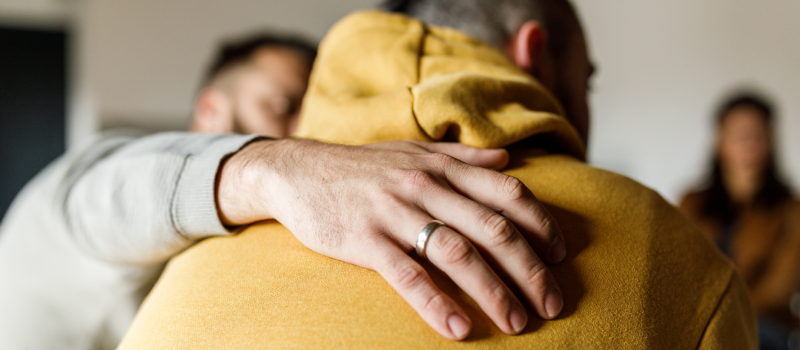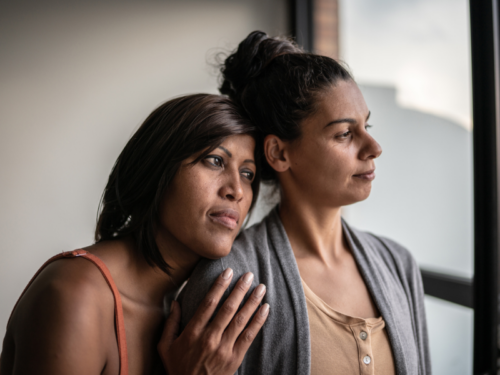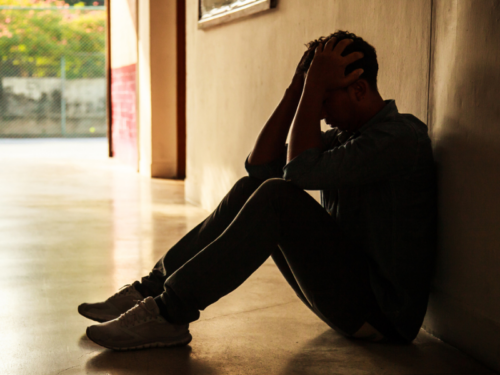
Table of Contents
Yes, Bipolar Psychosis Is a Real Condition— Here’s How to Cope

Written By: Sarah Fielding

Clinically Reviewed By: Sarah Lyter
October 14, 2024
5 min.
Everything you need to know about bipolar psychosis and managing it, according to experts.
Learn more about our Clinical Review Process
Table of Contents
While there are many common mental health diagnoses, such as bipolar disorder, anxiety disorder, borderline personality disorder, and more, different facets of each condition are often overlooked. Such is the case with bipolar psychosis, which can arise in anyone living with bipolar disorder.
Psychosis within bipolar disorder can be extremely debilitating and cause symptoms such as delusion and paranoia. These symptoms are in addition to those commonly associated with bipolar disorder (which usually manifests as bipolar I disorder or bipolar II disorder), a mood disorder marked by “extreme mood swings, depressive episodes, and manic episodes that impact a person’s behavior, sleep, energy, and ways of thinking or processing,” says Charlie Health Clinical Supervisor Tracye Freeman Valentine. Read on to learn more about the signs of bipolar disorder with psychotic features and tips for how to cope with both the mood symptoms and psychotic symptoms that can manifest in this mental health condition.

We specialize in treating serious mental health conditions
Begin virtual, intensive therapy for bipolar disorder today.
What is bipolar psychosis?
Bipolar psychosis can only occur when a person is already living with bipolar disorder. “Psychosis on its own is a state where a person loses reality and has difficulty telling the difference between what is real and what is not,” says Charlie Health Group Facilitator Clary Figueroa, MSW. “Symptoms of bipolar psychosis usually happen during a depressive episode or manic episode but are usually more common in manic episodes,” she adds.
Instances of psychosis can occur in both bipolar I disorder and bipolar II disorder, though they are more common in the former. A systematic review of 339 studies found an average of 60% of people living with bipolar I disorder experienced psychosis across their lifetime, while an average of 40% of people were currently experiencing it. Lifetime and current averages were 22% and 19%, respectively, for bipolar II disorder. In general, individuals were more likely to experience bipolar psychosis during manic or mixed episodes rather than depressive episodes.
Signs of bipolar psychosis
According to Freeman Valentine and Figueroa, signs of bipolar psychosis include:
- Feeling disconnected from reality
- Having a delusion
- Experiencing hallucinations through any of the senses
- Disordered thoughts or words
- Paranoia
- Acting differently than their norm
- Struggling to care for themselves
As Figueroa explains, these symptoms can manifest in several ways, such as incoherent speech, laughing at inappropriate times, or the belief that one is a celebrity or has superpowers.
5 coping mechanisms to limit the impact of bipolar psychosis
Coping mechanisms are critical for managing bipolar psychosis. As Freeman Valentine explains, “Having support, sharing a safety plan for mood management, and being proactive with recognizing symptoms are key protective factors in monitoring and avoiding full psychosis.” Here are five coping mechanisms that she and Figueroa recommend.
1. Manage your stress
Life is stressful and not always manageable, but take opportunities to release tension when you can. This could involve a myriad of methods like exercise, reducing your workload, and maintaining a good sleep schedule. “Many times, lack of sleep can cause a psychotic episode,” says Figueroa. “Be mindful of substances and alcohol as this can trigger a psychotic episode,” she adds. Attending therapy sessions can also help you explore different coping mechanisms and determine which are most beneficial to your well-being. Freeman Valentine has also seen her clients benefit from using a mood tracker — it can help with identifying warning signs and triggers.
2. Take your medicine
As Freeman Valentine explains, many individuals living with bipolar disorder will take a prescribed mood stabilizer, antipsychotic, or antidepressant — and compliance is critical. Yes, your medication might make you feel completely fine, and it might feel like taking it has become overkill. But that simply means it is likely doing its job. You might reach a point when medication is no longer necessary, but that is a decision to make alongside a qualified medical professional, stresses Figueroa. They can discuss your motivation and the best method for stopping the medication (which might involve tapering your dosage).
3. Create a safety plan
Preparing for psychosis or other depressive and manic symptoms of bipolar disorder, like mood swings, can go a long way toward mitigating them. “A good safety plan for mood management is important because it will define triggers and have defined mood changes and behavioral symptoms that occur before an episode and a plan of safety to act before, during, and after psychosis,” says Freeman Valentine. You can make this plan with trusted people in your life or a mental health professional.

4. Lean on your support system
A support system can be critical to identifying and managing bipolar psychosis. “They can help when it is hard for someone to identify when an episode is going to start and can help to mitigate future instances by supporting and checking in,” explains Figueroa. These individuals can be anyone you trust, such as family, caregivers, partners, managers, therapists, or doctors.
5. Seek therapy
On that note, Figueroa makes a critical point: “I would say to anyone who is struggling with psychosis just to know that there is help out there and hope,” she says, recommending professional mental health support in addition to the coping mechanisms listed above. “I know that psychosis can be scary, but you can get better and live a life that is what you want it to be.”
And, as Figueroa explains, this recommendation applies to caregivers and loved ones of people with bipolar psychosis, too. “No matter what, your loved one deserves respect, and sometimes you will need to advocate for them. Also, you need to get help and support for yourself. You matter, too,” she says.

How Charlie Health can help
If you or a loved one are struggling with bipolar disorder or another mood disorder, Charlie Health is here to help. Charlie Health’s virtual Intensive Outpatient Program (IOP) provides more than once-weekly mental health treatment for young people and families dealing with serious mental health conditions, whether that’s an anxiety disorder, depressive disorder, or other condition. Our expert clinicians incorporate evidence-based therapies into individual counseling, family therapy, and group sessions. With this kind of holistic treatment, managing manic symptoms or psychotic symptoms is possible. Fill out the form below or give us a call to start healing today.




